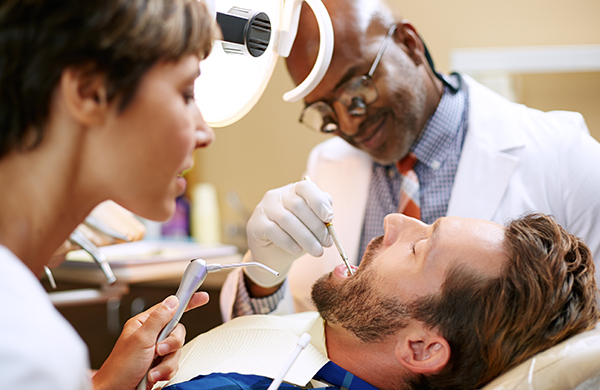
There you are, mouth unhinged as another human being scrutinizes the interior. Dental appointments put us all in a vulnerable position, and there are so many questions you might want to ask a dentist. What are all those pointy tools? What about invisible microbes? Should I make eye contact? What's that buzzing?
If you've ever felt anxious during a dental appointment, you're not alone. So for all of us, I decided to ask a dentist all the embarrassing questions you've probably been too nervous to ask yourself.
I rang up Dr. Kim Harms, a current spokesperson for the American Dental Association and a dentist for more than 30 years at her Minnesota practice. Below, she answers my dental questions and helps us all feel better about getting a checkup.
I haven't been to the dentist in a while. Are you going to judge me?
Dr. Harms doesn't mince words:
"If you feel you're being judged, get another dentist."
Throughout our conversation, she repeatedly brings up the word trust. "It's really important to know that your dentist is your partner in oral health. Our job together is to make sure you have your teeth in good health and good function for the rest of your life." According to Dr. Harms, patients should "ask any question they want. Really. The two of us are going to work together toward a common goal."
I saw a weird gum disease on the Internet. Do I have it?
People self-diagnose all the time, says Dr. Harms. And she's actually not annoyed by it. "Ask those questions!" she exclaims, before confessing that she does the exact same thing with her own doctors. "I read these things on the Internet, what about this, what about that. You're coming to the dentist to make sure your teeth are healthy and clean, but also to discuss any issues that are concerning you." So don't be shy. If WebMD convinced you that you're growing a third row of teeth, let the dentist put your mind at ease (or at least hook you up with extra floss).
Where do I look?
"Just be natural," says Dr. H. "If you're lying back in a chair, basically, your eyes are going to the ceiling." That's why, when she opened her own practice, she had her brother-in-law paint flowers up there. That's also why she lent out video glasses. Dr. Harms and her staff curated a selection of flicks, but they invited patients to bring in their own favorites, too.
"Instead of saying, this will take two hours, I can tell a patient: 'OK, this root canal will be the length of a movie.'"

Can you tell I'm not flossing as often as I should?
Yes, if your gums bleed. Maybe not, if you were diligent for a week beforehand in an effort to fool your dentist. Dr. Harms says this floss-fudging technique is practiced by many people, but asks, do you really want to trick the person who is simply trying to prevent cavities?
"Remember, we're your partners. We're not here to judge you."
Dr. Harms is adamant on this point. "Being 'caught'—that's not really a great way of thinking about your dentist, but it's a very common way. The best way is that we are all working together," she says. Flossing behavior affects different risk factors and being aware of how often someone flosses lets the dentist know what to keep an eye out for. So Dr. H. recommends patients fess up and "re-think why we're doing this. Flossing for two weeks might make gums bleed less, but it's not going to reverse the damage that was done."
In an effort to further convince me, she says:
"If [patients] could visualize the fact that by not flossing, you're keeping bacteria on your teeth that are multiplying and producing acids, I think more people would floss."
These bacteria, she adds, are "having a party between your teeth," and "once a cavity gets a foothold in your tooth, that's it."
Can I bring earbuds?
One of the more common dentist questions these days, it really depends on the dentist, but Dr. Harms doesn't mind. "Music, videos, movies, whatever," she says, encouraging patients to bring whatever makes them feel comfortable.

How do I keep my teeth clean and bright between visits?
"The key, and the proven formula, to maintaining your teeth for a lifetime is thoroughly brushing with a fluoridated toothpaste, two minutes a day, two times a day; flossing once a day; visiting your dentist on a regular basis; and maintaining a healthy diet."
And "be careful about your saliva," she says.
"Saliva is your friend."
Apparently, spit neutralizes acids, helps disinfect the interior of the mouth, and staves off dryness, which can keep corrosive acids in place. Dr. Harms notes that many common medications have dry mouth as a side effect. She recommends those patients (and all patients, really) drink plenty of water and chew sugarless gum.
"Another really important thing that people don't realize, is that it's not the amount of sugar or carbohydrates you eat during the day, it's really the number of exposures." Each sugary encounter represents what Dr. H. terms an "acid attack." She recommends eating sweets with a meal, rather than on their own. She also reminds me that beverages do damage, too, if they're sugary or acidic, saying:
"Sip all day, risk decay."
As I glance at the coffee cup on my desk, still steaming from the third refill of the afternoon I feel suddenly inspired to ask about keeping teeth white, and she lobs back this maxim:
"Anything that stains your carpet can stain your teeth."
To my chagrin, Dr. H. immediately name-checks blueberries, one of my favorite fruits. No mention of coffee, but still, I make a mental note to rinse my mouth after this cup.
If you've been bleaching your teeth at home, that's fine, she says, breaking into my thoughts. But "make sure your dentist knows what you're up to." That way, your dentist will be able to supervise and guide your process, offering personalized advice along the way. This kind of customized care doesn't cost extra, so do yourself a favor and just be honest.
And finally, can you tell I'm a little anxious? Because that gives me more anxiety.
"I think most people are a little anxious. Going to the dentist is not typically a favorite experience. But we're working on it." Some offices offer sedation, some offer nitrous oxide, and some have video glasses and flowers. "Before I started," she says, "we didn't have the things available to make it more comfortable. Today, [dental] education is focused on comfort."
There's a practical reason for this: "Anxious people tend to delay treatment, and dental disease does not go away by itself. The best thing an anxious person can do is go to those appointments."
And though video spectacles are great, most nerves can be tamed in low-tech ways. "Much of the anxiety is fear of what's going to happen," she says. "I think that sometimes people get frightened if they're not in control of the situation." A good dentist, she says, will put you in the pilot's seat, encouraging you to ask questions, take breaks when you need them, and work with the team to devise an appointment schedule. "There's no set interval" for appointments, she says, "but it's important to get that interval established. And prevention, of course, is key."
"I used to be a big chicken myself. I've gotten a lot better."
The bottom line? Don't delay cutting-edge medical treatment out of fear. Dr. Harms leaves me with a vivid image: "My grandparents used to keep their teeth in a jar by the bed. [But] we can keep our teeth in good form and function for the rest of our lives."

















